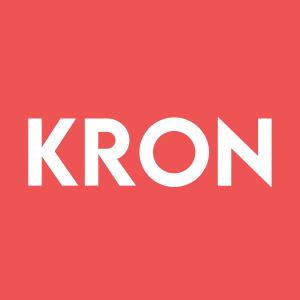Kronos Bio Data Presentation at EORTC-NCI-AACR Symposium Highlights the Importance of p300 KAT Inhibition in HPV-Driven Tumors
Rhea-AI Summary
Kronos Bio (NASDAQ: KRON) presented preclinical data from its p300 KAT inhibitor program for HPV-driven tumors at the EORTC-NCI-AACR Symposium. The research demonstrates that their p300 KAT inhibitor, KB-9558, effectively suppresses HPV oncogenes E6 and E7, which are critical for tumor growth. The inhibition leads to restoration of p53 and Rb tumor suppressor pathways, potentially offering a new therapeutic approach for HPV-driven cancers. The study showed that HPV integrates into specific genome locations where p300 regulates transcription, creating a vulnerability that can be targeted by KB-9558.
Positive
- Preclinical data shows KB-9558 effectively suppresses key tumor-promoting genes E6 and E7
- Demonstrated restoration of critical tumor suppressor pathways (p53 and Rb)
- Identified specific therapeutic vulnerability in HPV-driven tumors
Negative
- Research is still in early stages
- No clinical trial data available yet
- Effectiveness in humans remains unproven
News Market Reaction 1 Alert
On the day this news was published, KRON gained 5.53%, reflecting a notable positive market reaction.
Data tracked by StockTitan Argus on the day of publication.
– Preclinical data demonstrate that inhibiting the p300 KAT domain reactivates p53 in HPV-driven tumors resulting in anti-tumor activity –
SAN MATEO, Calif., and CAMBRIDGE, Mass., Oct. 23, 2024 (GLOBE NEWSWIRE) -- Kronos Bio, Inc. (Nasdaq: KRON), a company dedicated to developing small molecule therapeutics that address cancers and autoimmune diseases driven by deregulated transcription, today announced preclinical data from its p300 KAT inhibitor program for human papillomavirus (HPV)-driven tumors at the EORTC-NCI-AACR Symposium on Molecular Targets and Cancer Therapeutics.
Kronos Bio is exploring the utility of its p300 KAT inhibitor, KB-9558, for HPV-driven tumors. In the presentation, the authors show that the HPV genome preferentially integrates into transcriptionally active regions in the human genome where it becomes dependent on p300 to drive expression of its E6 and E7 oncogenes. It is widely recognized that elevated transcription of HPV E6 and E7 genes promotes degradation of tumor suppressors p53 and Rb. Importantly, inhibition of p300 KAT activity was highly selective in repressing the transcription of E6 and E7, which in turn led to restoration of the p53 and Rb pathways and drove anti-tumor effects through apoptosis and inhibition of uncontrolled tumor cell growth.
"Continued expression of certain viral genes, especially E6 and E7, plays a critical role in tumor growth and progression of HPV-driven tumors, including head & neck, cervical, and other anogenital cancers. Importantly, there are no approved targeted therapies that inhibit E6 and E7,” said Charles Lin, Ph.D., chief scientific officer of Kronos Bio. "While this is early-stage research, given the ability of p300 KAT inhibition to target E6 and E7 and restore tumor suppressor pathways, we believe this p300 KAT inhibitor has the potential to be a remarkable and unique approach toward ensuring that fewer people suffer from HPV-driven cancer."
In the presentation titled, "Oncogenic human papillomavirus hijacks p300 to drive viral transcription, creating a therapeutic vulnerability that can be exploited with selective p300/CBP catalytic inhibitors", the authors describe the experiments that led to the following key findings:
- HPV integrates into the human genome at specific locations where p300 regulates transcription
- p300 inhibition demonstrated specific and potent reduction of expression of HPV oncogenes E6 and E7, both at the RNA and protein level
- Loss of E6 and E7 led to restoration of p53 and Rb tumor suppressor pathways which led to the upregulation of p53 activated genes (e.g., CDKN1A) and downregulation of Rb repressed genes (e.g., CDK1)
- Re-expression of E6 and E7 from an exogenous lentiviral vector where viral oncogene transcription is not mediated by p300 KAT activity reversed the effects of p300 KAT inhibition on p53 restoration and anti-tumor effects
- These findings support the potential of KB-9558, a p300 KAT inhibitor, to treat HPV-driven tumors given its potential to suppress E6 and E7 expression and restore the p53 pathway
The poster presentation will take place on October 24, 2024, and is currently available under the Publications section of the Kronos Bio website.
About Kronos Bio
Kronos Bio is a clinical-stage biopharmaceutical company dedicated to developing small molecule therapeutics that address deregulated transcription, a hallmark of cancer and autoimmune disease. Our proprietary discovery engine decodes complex transcription factor regulatory networks to identify druggable cofactors. We screen for and optimize small molecules that target these cofactors in a disease-specific context. Kronos Bio has a pipeline of three drug candidates. Istisociclib (KB-0742) is currently enrolling ovarian cancer patients in a Phase 1/2 clinical trial. Preclinical candidate KB-9558 is being developed for multiple myeloma and HPV-driven tumors. KB-7898 is Kronos Bio’s first autoimmune development candidate and has a target indication of Sjögren’s disease. Kronos Bio is based in San Mateo, Calif., and has a research facility in Cambridge, Mass. For more information, visit https://www.kronosbio.com or follow the Company on LinkedIn.
Forward-Looking Statements
Statements in this press release that are not statements of historical fact are forward-looking statements for purposes of the safe harbor provisions of the Private Securities Litigation Reform Act of 1995. The press release, in some cases, uses terms such as “anticipate,” “believe,” “could,” “expect,” “plan,” “will,” “may,” or other words that convey uncertainty of future events or outcomes to identify these forward-looking statements. Forward-looking statements include statements regarding Kronos Bio’s intentions, beliefs, projections, outlook, analyses or current expectations concerning, among other things, KB-9558’s ability to potentially treat HPV-driven tumors; the potential of Kronos Bio’s product candidates, pipeline and its proprietary discovery engine; and other statements that are not historical fact. Actual results and the timing of events could differ materially from those anticipated in such forward-looking statements as a result of various risks and uncertainties, including, without limitation: changes in the macroeconomic environment or competitive landscape that impact Kronos Bio’s business; whether Kronos Bio will be able to progress its preclinical pipeline on the timelines anticipated, including due to risks inherent in the development of novel therapeutics; the risk that results of preclinical studies, early clinical trials (including preliminary results) and pharmacokinetic modeling are not necessarily predictive of future results; and risks associated with the sufficiency of Kronos Bio’s cash resources and need for additional capital. These and other risks are described in greater detail in Kronos Bio’s filings with the Securities and Exchange Commission (SEC), including under the heading “Risk Factors” in its Quarterly Report on Form 10-Q for the quarter ended June 30, 2024, filed with the SEC on August 8, 2024. Any forward-looking statements that are made in this press release speak only as of the date of this press release and are based on management’s assumptions and estimates as of such date. Except as required by law, Kronos Bio assumes no obligation to update the forward-looking statements whether as a result of new information, future events or otherwise, after the date of this press release.








